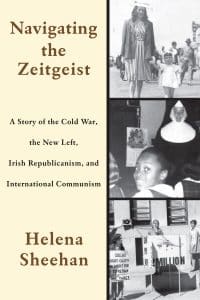Navigating the Zeitgeist: A Story of the Cold War, the New Left, Irish Republicanism, and International Communism
308 pp, $25 pbk, ISBN 978-1-58367-727-8
By Helena Sheehan
Reviewed by Kate Hudson for Transform: A Journal of the Radical Left, Issue #7 | March 2020
The backward and repressive nature of the 1950s in regard to rights and opportunities for women has been widely exposed, not least through cultural representations like ‘Mad Men’, Doris Day films, and every single domestic appliance or kitchen advert from that decade and beyond. Women are housewives and mothers, slim and glamorous with high heels and frilly aprons. It’s easy to laugh now at these caricatures which hid an uncomfortable and often very unhappy reality. But it would never have occurred to me that in contrast to the life of a 1950s housewife, a bright and highly intelligent young girl would choose, in preference to that fate, to become a nun. But so was the case with Helena Sheehan, born into 1940s USA. The women in the world of her youth, she explained, were ‘housewife-mothers and teacher nuns and shop assistant-maiden aunts.’ Helena opted to be a teacher-nun, ‘aiming toward something larger and higher than the small domesticated lives of other women’.
In spite of academic success at high school, extensive reading, emerging political engagement and questioning of the church’s authority, she pursued this intention with the determination of a vocation. What becomes clear in reading Sheehan’s biography, is that she was embarking on her life-long project – to understand the world, the big picture. She rejected the limits of those times, reaching beyond the minutiae which shaped everyday lives, and particularly those of women confined to the domestic sphere. At that point for Sheehan it meant entering the convent, because she ‘yearned to have a comprehensive world view and to live in harmony with it’. Catholicism provided just such a framework, with the additional bonus of the promise of divine revelation to take one beyond the limits of mere human reason.
The convent, still in the days of pre-Vatican II Catholicism, presented Sheehan with many challenges, not least the requirement of blind, unquestioning obedience which she found alien to her, and she was constantly reprimanded for intellectual pride. When religion’s own limits in turn became intolerable, Sheehan took the path towards Marxism, expressed in a number of iterations over the subsequent decades and that same striving to comprehend shaped those political choices too. That path took Sheehan out of the convent in 1965 throwing herself with characteristic intensity into her university philosophy studies. ‘Philosophy’ she says, ‘preoccupied nearly my every waking moment.’ In 1967 she joined Students for a Democratic Society and threw herself into campaigning against the Vietnam war. Sheehan’s account of her activity and her commentary on the various radical trends of the time is fascinating, especially the tactical debates within the anti-war movement and the rise of feminism and its impact on Sheehan herself.
In 1972, Sheehan bought a one-way ticket to Ireland, having become increasingly engaged in the debates in the American Irish community following the split between the Official and Provisional Sinn Féin/IRA. Sympathetic to the Official perspective, she joined Sinn Féin and subsequently the IRA. It was during her early years in Ireland that Sheehan both became a Marxist and gave birth to a son and daughter. By 1975, the IRA-INLA split had led to armed warfare within the republican community and early that year Sheehan resigned from Sinn Féin, saying that ‘the movement was floundering, without proper discipline or clear ideology, and that serious Marxists were being isolated and undermined.’
Her search for a Marxist political home took her into the Communist Party of Ireland which she felt was the embodiment of the international communist movement: ‘I felt that I had become a communist and that I might as well be in a communist party’. Largely comprising male manual workers, the CPI at that time was dominated by ideological debate over the Prague Spring and Warsaw Pact intervention. The CPI had opposed the intervention in 1968 but there were moves from a section of the leadership to alter this position. Sheehan became deeply involved in these debates, from an anti-intervention perspective, but while she came to agree with Eurocommunism in the sense of stressing the importance of democracy under socialism, its evolution and development, and the importance of new alliances and new social movements, she rejected the tendency of some to unravel ‘everything that made Marxism what it distinctively was’. Sheehan also visited London over a number of years to participate in the CPGB’s annual Communist University of London and became engaged in the intellectual debates within the CPGB which she found much more vibrant than those in the CPI.
In 1977 she attended the International Lenin School in Moscow where hundreds of communist studied, many using pseudonyms as their parties were illegal in their home countries. Most students were on long courses of a year or more, while Sheehan attended a short course in Soviet studies, from a Soviet perspective. She returned the following spring for four months to pursue her research on Soviet philosophical debates in the 1920s and 1930s at the Academy of Sciences and Moscow State University where she interacted extensively with Soviet intellectuals, discovering a diversity of views including those looking for ways to evolve the ideas that had flourished in the thaw between 1956 and 1968. She went on to give lectures as well as a series of broadcasts on Moscow Radio, subsequently visiting Prague and Berlin for further philosophical work and intellectual engagement, exploring both the possibilities and limits of the academic system.
By the end of 1979, her critical attitudes towards the lack of debate within the CPI, her opposition to the reversal of the anti-intervention position, and her evolving left-Eurocommunism led her to leave the party, amidst considerable acrimony. In 1980 she received her PhD, published in 1985 as Marxism and the Philosophy of Science: A Critical History. In the years that followed, she increased her academic scope, writing, lecturing and visiting extensively in eastern Europe and elsewhere. She joined the Irish Labour Party alongside others who had left the CPI for similar reasons, against the 1980s backdrop of advancing Thatcherism and Reaganism. Sheehan hints in her final paragraph about the further cataclysmic changes to come in the late 1980s and beyond, but does not embark on that journey here. It is very much to be hoped that she comes back with a second volume of memoirs addressing the next phase in her life – and in the world historic events that she has sought to engage with. Whilst I have only sketched out here the barest bones of Sheehan’s political work and affiliations, this volume is packed with enormous personal, social and cultural interest and a myriad anecdotes and memories which open a door onto a political world that has changed and evolved yet has crucial relevance for our work today.
As Sheehan wrote in the late 1990s, on grand narratives and the conceptualisation of history, Marxism ‘is the only mode of thought able to give a coherent, comprehensive, and credible account of the complexity of contemporary experience.’ In that mode of thought Sheehan flourished, developing ultimately a hugely independent approach, characterised not only by intellectual rigour but intensely engaged activism and practice. Those who have followed her work in Greece during the Syriza ascendancy – which she has written about with insight in The Syriza Wave – will recognise these fundamental attributes. As a philosopher Sheehan is an outstanding public intellectual, an intellectuel engagé and should be celebrated as such. There is much both to learn and to enjoy in this memoir.
Copyright, Transform: A Journal of the Radical Left Reprinted with permission


Comments are closed.